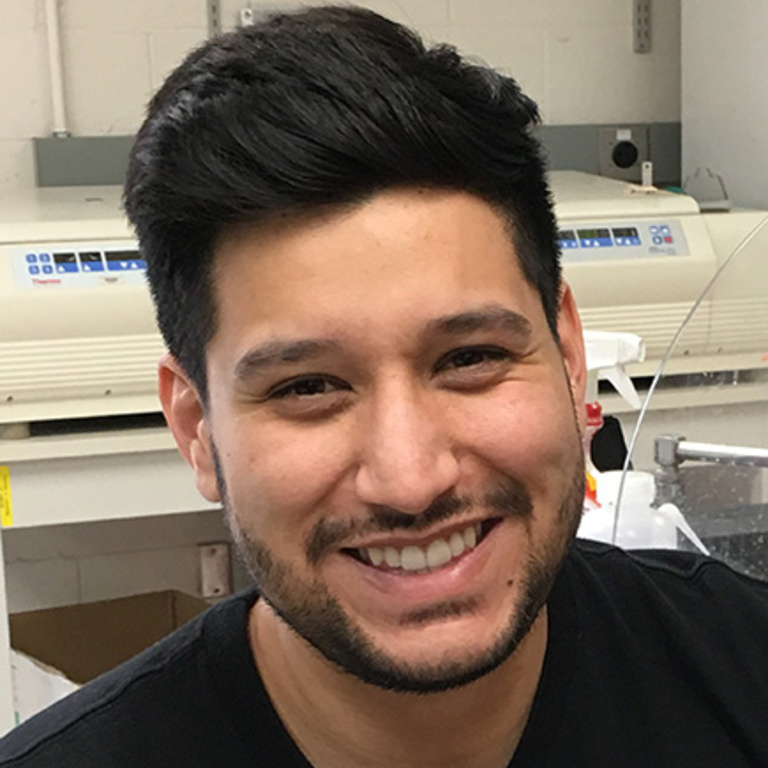Roger Berton, MS
Education
Bachelor of Science in Biology- California State University, Stanislaus
Master of Science in Biology- California State University, Los Angeles
Research
I am interested in examining how sepsis induces alterations of the Naïve CD8 T Cell Compartment. Sepsis is characterized by a disseminated infection, resulting in a hyperinflammatory state, followed by prolonged immunoparalysis which is characterized by severe transient lymphopenia and long-lasting immunological dysregulation.
Our lab focus on naïve and memory CD8 T cell responses after acute infections and/or vaccinations. Upon cognate antigen-encounter naïve Ag-specific CD8 T cells undergo proliferative expansion in numbers and differentiate into effector cells that contribute to pathogen clearance. Thus, the status of naïve CD8 T cell compartment can determine the ability of the host to respond to newly encountered infections.
Sepsis induces rapid and vigorous apoptosis of naïve (Ag-non experienced CD11alow/CD8ahigh CD8 or CD11alow/CD49dlow CD4 T cells) T cells creating a lymphopenic environment supporting homeostatic proliferation (HP) of T cells that survive early ‘cytokine storm’ phase of sepsis. As a consequence of HP and in response to microbes that evoke sepsis, numerical recovery of T cell compartment is accompanied by phenotypic/functional changes (memory-like T cells) on a sizeable fraction of T cells. Sepsis can induce ‘holes’ in the T cell repertoire further contributing to overall changes in the composition of T cell pools, making their subsequent T cell responses to newly encountered pathogens potentially impaired.
One of my projects will be to further delineate sepsis-induced long-lasting functional, epigenetic, and transcriptomic changes in naïve CD8 T cells using state-of-the-art techniques and models readily available in the lab.
Publications associated with the lab
- Silva EE, SJ Moioffer, M Hassert, RR Berton, MG Smith, S Van de Wall, DK Meyerholz, TS Griffith, JT Harty, and VP Badovinac. Defining parameters that modulate susceptibility and protection to respiratory murine coronavirus MHV1 infection. J Immunol in press (2024)
- Berton RR, PW McGonagill, IJ Jensen, TK Ybarra, GA Bishop, JT Harty, TS Griffith, and VP Badovinac. Sepsis leads to lasting changes in phenotype and function of naïve CD8 T cells. PLoS Pathog 10: e1011720 (2023) [PubMed]
- Moioffer SJ, RR Berton, PW McGonagill, IJ Jensen, TS Griffith, and VP Badovinac. Inefficient recovery of repeatedly stimulated memory CD8 T cells after polymicrobial sepsis induction leads to changes in memory CD8 T cell pool composition. J Immunol 210: 168-179 (2023) [PubMed]
- Berton RR, IJ Jensen, JT Harty, TS Griffith, and VP Badovinac. Inflammation controls susceptibility of immune experienced mice to sepsis. Immunohorizons 6: 825-842 (2022)[PubMed]
- Jensen IJ, PW McGonagill, RR Berton, BA Wagner, EE Silva, GR Buettner, TS Griffith, and VP Badovinac. Prolonged ROS production following septic insult. Immunohorizons 5: 477-488 (2021) [PubMed]
- Sjaastad FV, IJ Jensen, RR Berton, VP Badovinac, and TS Griffith. Inducing experimental polymicrobial sepsis by cecal ligation and puncture. Curr Protoc Immunol 131: e110 (2020) [PubMed]
- Danahy DB, RR Berton, and VP Badovinac. Cutting Edge: Anti-tumor immunity by pathogen-specific CD8 T cells in the absence of cognate antigen recognition. J Immunol 204: 1431-1435 (2020) [PubMed]
